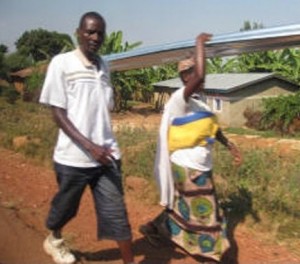An astounding 38 percent of the young women at a pre-natal clinic in South Africa tested positive for HIV, according to a recent study conducted by Allison Groves of American University.
A recent report on the study, broadcast on National Public Radio’s All Things Considered, explained the link between abuse and HIV infection. Most of the 1500 pregnant women in the study had been faithful in their marriage or committed relationship, so it is very likely they were infected by their husbands/partner. Furthermore, 60 percent of them had been raped—by their partners. Forty percent had been physically or sexually abused during their pregnancy or shortly after giving birth.

I suspect that if the author had asked the women if they’d had sex when they didn’t want it, but short of actual rape, many more would have said yes.
How can we stem the tide of the HIV epidemic in places where consent is not even up for discussion? African women have very little power in their sexual relationships. In many places, men believe that their good health requires them to have sex every day. Not only do women have little control over when and how, it is difficult if not impossible to convince the man to use a condom. Even suggesting that a man use a condom might provoke physical abuse.
The NPR report goes on to talk about a hoped-of solution to these problems: a vaginal ring which can be worn without the partner’s knowledge. This small device releases chemicals that are 70 percent effective at preventing HIV infection, when used consistently. The nonprofit International Partnership for Microbicides developed the ring, and is currently working to get it approved by the World Health Organization.
Preventing HIV infection is critically important. And while the ring, which a woman can wear without her partners’ knowledge, can reduce her chances of infection, it doesn’t change the fact that her husband is demanding sex from her without her consent. It doesn’t keep her husband from becoming infected (presumably by someone else) and bringing that home. It doesn’t protect her from being raped or abused. Yes, it is a tool that can and should be used. However, it falls short of really solving the problem.
We believe there is another way to approach this crisis, and in fact, we are working constantly to implement our strategy for change. Empower International strives to get at the root cause of such life-and-death issues. Our programs work to prevent HIV, rape, and abuse by addressing the attitudes and beliefs that allow men to treat women in such a self-serving and callous manner. We don’t just educate women about how to prevent HIV, we educate men and women to reexamine and change their beliefs about the very nature of their relationships.
One might think that these men who force sex on their partners are not Christians, and so could not be reached by Bible-based teachings. But that is not necessarily so. Steven Tracy of Mending the Soul ministry once argued for three days with Christian pastors in Congo about whether women were obliged to have sex with their HIV-infected husbands. The Congolese insisted that she must, that providing sex to her husband was “what women were for.” This is a very common attitude, even among Christians.
Part of this insistence comes from the cultural practice of bride- or dowry- price. In most areas of Africa (and indeed in a great many developing countries, including China and Afghanistan), men must pay the bride’s family a substantial sum in order to marry her. When we ask what the man expects to get in exchange for his cows and goats, the answer is: children, labor/food, and sex.
Our Africa Program Director Frank Michael Tweheyo reports similar attitudes in Kenya, where we presented the New Man, New Woman, New Life seminar in June.
The Kenyans told him that conflict over sex is often an issue, with men accusing their wives of “torturing” them by withholding sex, and wives complaining of their husbands expecting sex on demand and with no concern for whether she is ill.
Another imagined justification for this entitlement comes, unfortunately, from a very common belief that women were cursed by God after the Fall (in Genesis 3). This belief gives religious leverage to men who insist that women are obligated to provide their husbands with children, labor, and sex.

The New Man, New Woman, New Life seminar, however, allows participants to explore for themselves how Genesis 3:16 is not a curse on the woman but rather an explanation of how sin and the Fall lead to her subordinate status and mistreatment by men. The seminar also explores Jesus’ teaching, who said, “in the beginning it was not so” and further, is not to be anymore among Christians. Jesus, in fact, explicitly refutes cultural expectations that women have no worth beyond the provision of children, labor, and sex.
When a man comes to a true understanding of God’s intent in making us as “male and female,” his attitude towards his wife changes radically. No longer is she just a “worker” there to provide children, labor, and sex; no longer can he believe himself entitled to her services. The challenge for Empower in 2017 is to add material on the godly treatment of each other sexually.
You might expect that such counter-cultural teaching would be unwelcome. Somewhat surprisingly, we actually get more requests to come and teach than are able to accommodate. We believe that the message of New Man, New Woman, New Life is needed in Africa, and in fact, many churches across the continent have asked us to come and teach it. What we need, of course, is additional funding to make these seminars a reality. We’re eager to take this message to more churches and colleges, and to expand our curriculum to include more sexual education, and need your help to make it happen.
HIV-AIDS has devastated Africa, and continues to do so. While we obviously applaud the work of doctors and medical groups to develop medications and other solutions such as the ring, those solutions treat the symptoms of a larger problem. Infidelity, abuse, marital rape, refusal to use condoms—all these actions come from attitudes that are based on faulty theology, and all contribute to the spread of HIV. Educating men (and women) about God’s design for mutuality and respect in marriage can change the attitudes and wrong beliefs that allow this tragic epidemic to continue. By changing attitudes, we can begin to change actions. We believe that the truth will, indeed, set people free.
